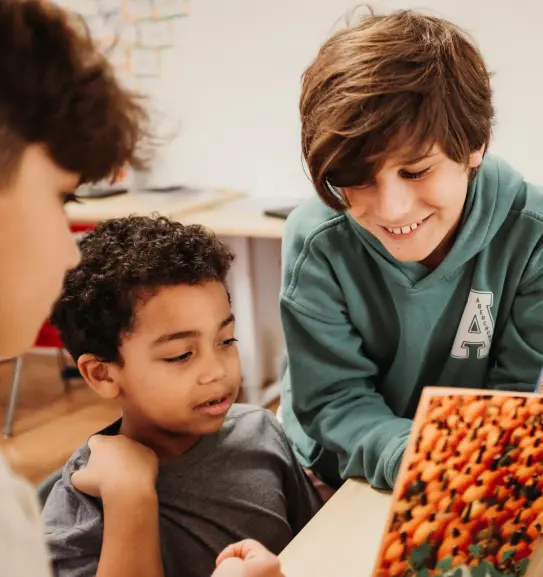Why Primer
Our curriculum is tailored to each student, allowing them to learn at their own pace in core academics. This ensures every student is actively engaged— no one is left behind and no one is held back.
At Primer, we focus on goals, not grades. Our approach is student-led, empowering them to take charge of their learning and develop a deeper understanding. Our ultimate goal is simple: a learning experience where kids feel accountable not just to their teacher, but to themselves.
Every afternoon at Primer is magic. We call this time Pursuits because kids have focused time to explore their passions. With dedicated time for deeper learning driven by their interests, students are gaining real-world relevance and building important life skills.
Grades K-2 blends foundational skills with creative exploration to build independence, purpose, and a love for learning.
School dropoff
Mornings at Primer focus on building the foundation for core academic skills, with an emphasis on literacy and math.
Lunch and recess
Every afternoon is reserved for explorative project-based learning. These projects are driven by students' interests, from robotics to arts.
School pickup
Aftercare (optional)
Our literacy program is rooted in a balanced approach, integrating phonics for foundational skills and knowledge-based learning for comprehension and context. We guide students from learning to read to reading to learn, setting them up for academic success across all subjects.
Math at Primer is not just about numbers; it's about conceptual understanding. We emphasize the base-10 place value system and foundational operations, teaching students to think critically and solve problems logically, preparing them for advanced math concepts.
Microschool Leaders integrate social studies and science into the curriculum through class-led projects. Primer's early learners engage in a wide variety of topics that deepen their understanding of themselves and the world around them. These projects include things like the exploration of light and properties of matter, writing to penpals at other Primer campuses, and opportunities for students to learn about food waste and hunger.
.webp)
Project-based learning at Primer is an opportunity for students to engage with real-world problems and interests, encouraging deeper learning and a practical understanding of how their lessons apply beyond the classroom.

Primer’s mixed-age classrooms offer a unique environment where students learn at their own pace, benefiting from peer learning and social interaction. Students work in small, flexible groupings determined by level rather than age to ensure no one is left behind and no one is held back.

Primer educators are more than teachers; they're mentors, guides, and leaders. They know each child, understand their strengths and areas for growth, and build strong, lasting relationships that make a real difference in each family's educational journey.

At Primer, safety is our top priority. We implement thorough safety measures, including extensive background checks, clear emergency communication, and comprehensive staff training. To learn more about the safety measures at Primer, check out our blog.

Yes, we offer an aftercare program at all of our Microschools, running from 3:00 PM to 5:30 PM. Our aftercare leaders provide a safe, fun, and educational experience for all Primer kids.

For our Early Learners, we keep screen time to a minimum. Microschool Leaders thoughtfully set up learning stations in the classroom and guide students through rotations in both Math and Literacy. At times, some of those stations might involve learning apps to reinforce key skills.

We prepare students for the real world. We focus on developing essential life skills that students can take with them outside of the classroom like setting personal goals, instilling a genuine love for learning and fostering meaningful relationships. We ensure that students not only leave with a solid academic foundation, but they are also equipped with a diverse skill set for life after Primer.

Primer has a zero-tolerance policy towards bullying. We are deeply committed to providing all of our students with a safe, respectful, and nurturing environment. To learn more about our policy, check out our blog post here.

Our Microschools focus on small-group, student-centered learning, ensuring that every Primer kid gets the support they need and learns to work collaboratively. Each campus has a unique community where families can feel connected to their child's educational journey.
